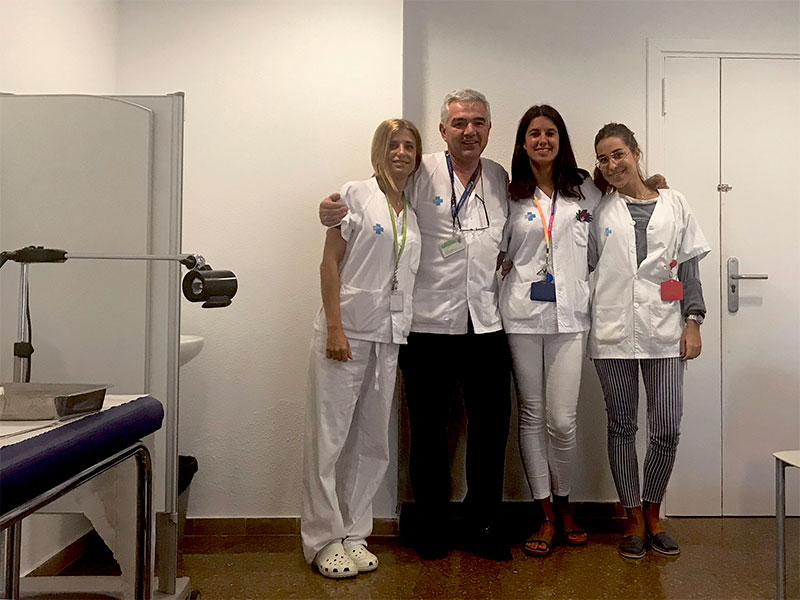New research projects in neurofibromatosis thanks to the support of the Neurofibromatosis Project Foundation

The Hereditary Cancer Research Group at the IGTP studies the genetic diseases that bring a high risk of developing cancer, one of which is neurofibromatosis (NF). The group has just started two new projects to study neurofibromatosis types 1 and 2 thanks to the support of the Neurofibromatosis Project Foundation.
NFs are a group of hereditary diseases all of which bring a predisposition to developing tumours in the peripheral and central nervous systems, along with other clinical signs, which progress as the patient gets older. The Can Ruti Campus hosts a concentration of activities related to the management and research of NFs. The Germans Trias i Pujol University Hospital has the CSUR for Phakomatosis (National Reference Centre in genetic neuro-cutaneous syndromes), a unique multi-disciplinary centre specialized in the clinical management of people suffering from one of the phakomatosis diseases and especially NFs. The professionals of the CSUR work very closely with the Hereditary Cancer Research Group of the IGTP and the Genetic Counselling Programme to share the experiences of doctors and patients with scientists and help the researchers look for solutions.
Due to this professional activity, the Neurofibromatosis Project Foundation has financed two new projects, which are already underway on the campus. The Foundation is a charity, created in December 2010 by the Neurofibromatosis Patients Association with the aim of promoting medical research that will improve the lives of people affected by these diseases. The Foundation finances research projects into effective treatments for people affected by NFs.
These two new projects are additional to another two that the Foundation has already financed for the research team on Can Ruti Campus. "The research grants provided by the Neurofibromatosis Project Foundation are very important, they allow us to strengthen our lines of research and initiate new projects," considers Dr Ignacio Blanco, Head of the CSUR Unit at Germans Trias Hospital. "The preliminary results we have already obtained from these projects have enabled us to receive more funding and train new researchers specialized in neurofibromatosis," adds Dr Eduard Serra, Principal Investigator of the Hereditary Cancer Group.

About the projects being financed
One of the projects, "Bioinformatic and genomic analysis of tumours associated with neurofibromatosis Type 1," is codirected by Dr Bernat Gel and Dr Eduard Serra and the research being carried out will form part of the doctoral thesis of Mirian Magallón. The group has studied the benign and malignant tumours of the peripheral nervous system associated with NF1 using different "omics" tools; genomics, transcriptomics and epigenomics. The challenge consists of integrating all this information through bioinformatics analysis to convert these catalogues of data into relevant biological information in order to understand these tumours, while at the same time they can also be used by doctors to manage and treat them.
The second project, "PROCAV12 Study. Improving prognostic and quality of life evaluations for neurofibromatosis type 2", co-directed by Dr Elisabeth Castellanos and Dr Ignacio Blanco, aims to improve the correlation between the symptoms presenting in patients and the genetic basis causing them and modifying NF2. The study is based on the integrated study of genetic, epigenetic and functional factors, such as modifiers of clinical variation in NF2. It also includes a study of quality of life for these patients through a questionnaire that has been adapted and validated internationally. Another researcher, Núria Catasús is preparing her doctoral thesis in the context of this project.
The two projects already completed at the campus thanks to financing from the Foundation are the "Study of the implication of the NF1 gene in the regulation of the cAMP/PKA pathway in Schwann cells. Identification of new therapeutic strategies for dermal neurofibromas, plexiform neurofibromas and MPNSTs," directed by Eduard Serra and the project "Precision Medicine in NF2. Molecular basis of phenotypic variation and aggressiveness of symptoms," directed by Ignacio Blanco. The first project studied how neurofibroma (the product of the NF1 gene) regulates the activity of the cAMP/PKA pathway in order to use the information to develop new therapeutic strategies for the tumours of the peripheral nervous system associated with this disease. The second project explored the genetic basis of two groups of NF2 patients, one with mild symptoms and one with more aggressive symptoms in order to better understand the role of NF2 and other genes on the genome in the development of clinical symptoms of this disease.
